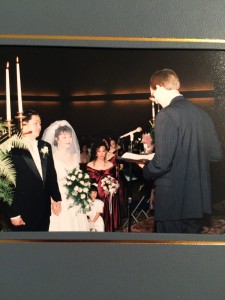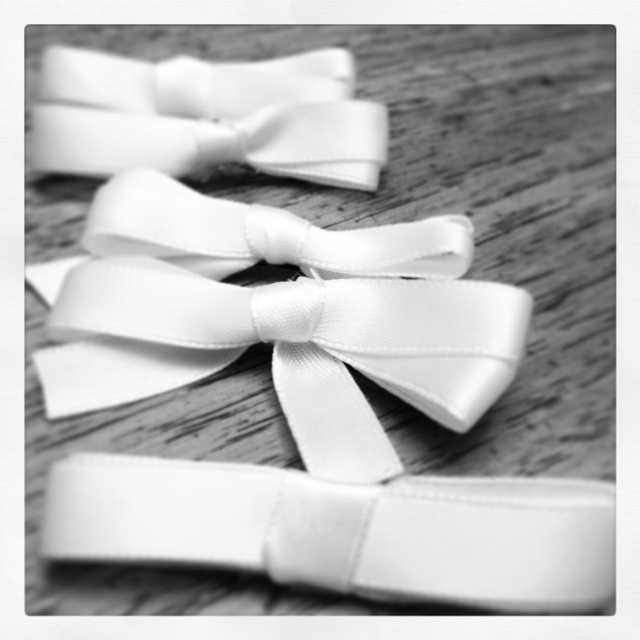Sometimes the expression of an emotion has to catch up to the spiritual disruption. Grief is a very strange, powerful, exhausting emotion, and it didn’t really hit me until I opened my mouth and said the words on the phone.
“Someone very important to me died this morning. He has been my pastor since I was 15,” I said, requesting to be excused from a retreat I was to have attended addressing the connection between body and soul.
How appropriate that in finally saying the words I burst out in tears over the home-going of Rev. Robert D. Goette, good and faithful servant, pastor, husband, father, son, brother, uncle, spiritual father, lover of peanut butter, Bears fan married to a Packers fan, church planter, evangelist, leader, and friend.
Someone said Robert may now find himself bored because there is no one in heaven to share the Good News of Jesus with, but he is healed from the ALS that took him physically away from his family and friends bit by bit over the past 5 1/2 years. He lived longer than doctors initially expected, but that’s Robert.
Robert was a missionary kid to parents called to South Korea. By the time I met him (I was in high school) he was gathering groups of Asian American kids in the Chicago suburbs – mostly but not exclusively Korean Americans – for Bible study and fellowship. He and sometimes a few volunteers would pick up these kids to meet in the basement of a family’s home and meet Jesus in the form of a tall, lanky, blonde, soft-spoken white dude. Yes, Jesus was white in those years but strangely Korean because of his missionary kid experience. Robert had a unique perspective on and personal connection with the spiritual formation of Korean American children and youth – children of Korean immigrants caught somewhere between being the first and second generation in the U.S. also known as the 1.5 generation.
Me.
Robert understood that a generation of kids were growing up in the abundance of America with parents who had just experienced the aftermath of a war – the Korean War – and the political and social turmoil that followed. Robert knew that the language and cultural gaps would widen, that Western churches were ill-equipped to welcome us (they were happy to rent their spaces so long as we didn’t smell them up too much with our food, which really was superior to donuts and coffee IMHO), and that Korean churches would lose us because of the very gaps caused by chasing the American Dream.
Korean pastors thought he was stealing sheep even though most of us sheep weren’t thrilled to sit in the pews listening to pastors preaching in Korean, couldn’t (or didn’t want to or were never invited to) go to the white church youth groups, or weren’t going to church at all. And I have no idea what his white pastor-peers were thinking as he slowly built the foundation of a church with a bunch of junior high and high school kids.
Surely some people thought he was crazy because junior high and high school kids are not the group church planters are going after. That is not the demographic strategic, trained church planters necessarily go after when dreaming of a strong core. Kids are flaky and unreliable. We don’t have an income let alone our own modes of transportation. We bring and create drama (we were K-drama before it was a thing). We are immature in ways our non-Korean peers were not because we also did not have parents who understood America.
Yup. Robert was crazy.
I’m so grateful Robert was crazy. His investment in my spiritual formation and the formation of a generation of Korean American kids is immense. He understood that my experience as a Korean American child of immigrants was going to mean life and a journey with God would have different turns and curves and bumps and that I would need a place with peers who spoke and understood my heart language – not Korean, necessarily, but a way of understanding and connecting and expressing what our non-Korean American peers could not understand, would never experience, but at some point would benefit from our articulation and expression of it. Robert knew the Kingdom of God needed my generation before most of us cared, and his faithfulness in investing, discipling, mentoring, pastoring, and evangelizing…well, even though it had been a long time since Robert could speak on his own I knew he was still Robert. Even when he ceased to be the senior pastor at Grace Baptist and then Grace Community Church. Even when Peter and I left the church. Even as we stopped seeing Robert and Julie, his wife, on any basis. Even as ALS took away more than Robert’s balance. Robert was still Robert. He was still a missionary, a church planter and trainer of planters, a husband to Julie and father to Jennifer, Emily, and Robbie.
And because Robert was faithful I owe him a huge debt of gratitude. Before I knew what ethnic-specific ministry was, Robert and those who believe in Robert did it. They invested in a bunch of kids who grew up to become doctors, lawyers, pastors, investment bankers, traders, and designers. He followed us to Northwestern University, the University of Chicago, and the University of Chicago – Circle Campus; bible studies on those campuses eventually became Asian American Christian Fellowship chapters connected to JEMS – Japanese Evangelical Missions Society and then later affiliated with InterVarsity Christian Fellowship/USA. Yes, the very organization I work with. See?
There is so much to be thankful for, so much to remember.
Grief is a very strange and powerful emotion. I’m looking forward to being on the other side of it someday.

Robert was one of three pastors we had presiding at our wedding. He also was the only one who spoke in English, the only one Peter could understand, and the only one who knew me. Robert didn’t mind being one of three. He understood the Korean family/church politics involved in planning the wedding of two firstborns and the son of founding elders of a church. Peter and I have been married 22 years, and we still remember the gist of what Robert said to us about respecting and cherishing each other.

